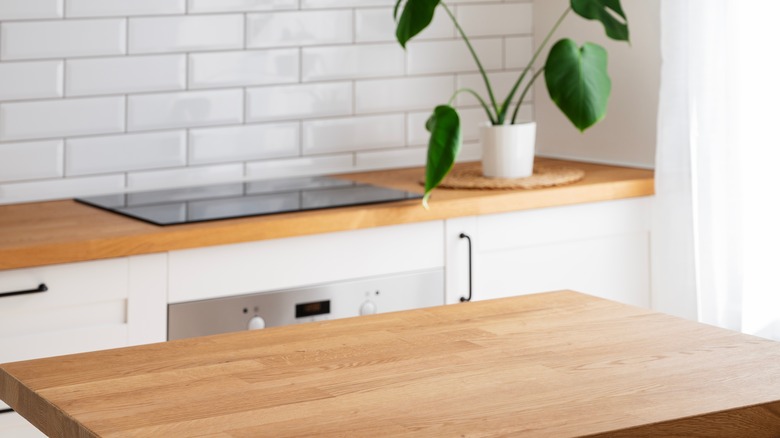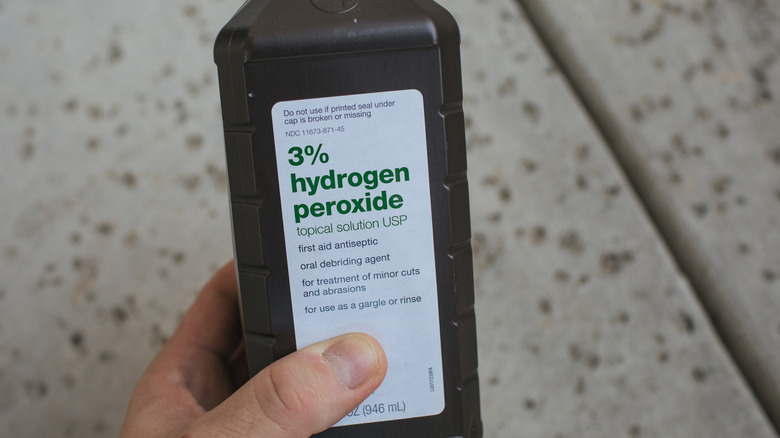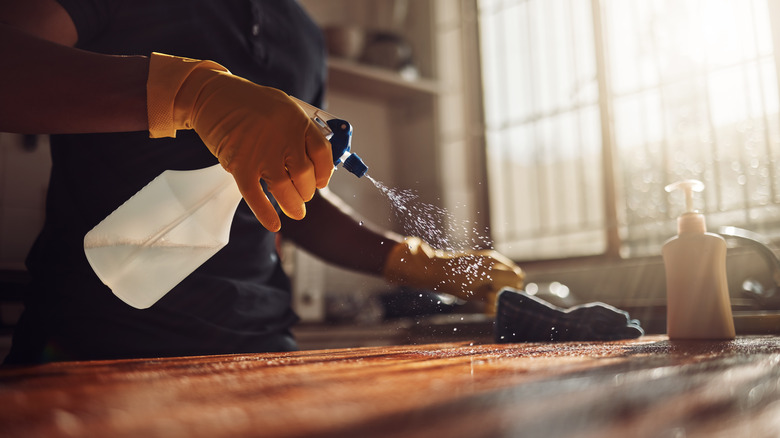The Household Essential That'll Revive Your Dirty Butcher Block Countertops
Butcher block countertops lend a warm and timeless charm to any kitchen, but they can be surprisingly troublesome to maintain. While it might look clean and smooth, butcher block wood is much more porous and scratchable than traditional countertop materials like quartz and granite. Because of this, it can easily trap liquids, dirt, odors, and even mold and mildew over time, making it necessary to clean and sanitize the surface regularly to keep butcher block in pristine condition. Fruit juices, wine, and coffee rings can be some of the worst staining offenders, but luckily, you don't have to buy anything special to get the cleaning job done. If you're wrestling with stained, sticky, or dirty butcher block countertops, just grab a bottle of hydrogen peroxide.
A staple in most people's bathroom cabinets, hydrogen peroxide is one of the best things you can use to clean your butcher block countertops because it's gentle, effective, and dries quickly. Further, it's also quite easy to apply once diluted correctly. This product could be the easy disinfecting solution you've been looking for.
Hydrogen peroxide gently cleans and disinfects
How does simple hydrogen peroxide work miracles on butcher block? Hydrogen peroxide is basically a mild bleaching agent that's gentle enough to work on porous wood surfaces (and even laundry) without causing damage. The solution works to lift and dissolve stains by breaking down chromophores, the chemical structures that cause color. Once these molecules are broken down, they become much easier to pull up and out of the wood grain.
Hydrogen peroxide can do much more for your countertops than just lift stains and dirt; it also disinfects surfaces, ensuring your butcher block is safe for food preparation, even though it's porous. According to the Centers for Disease Control and Prevention, hydrogen peroxide can kill bacteria, fungi, molds, and even viruses, making it especially useful for cleaning mildew spots around your kitchen sink and other frequently-damp areas. Another reason why hydrogen peroxide is advantageous for butcher block is because, like isopropyl alcohol, it evaporates rather quickly. Allowing moisture to sit on butcher block for too long can cause it to warp, so peroxide's quick-drying time will allow you to get in, lift stains, and get out without affecting the wood structure.
How to clean butcher block with H2O2
For smaller stains and grimy spots, mix 1 tablespoon of 3% hydrogen peroxide into 1 cup of warm water. Apply the mixture to your butcher block with a spray bottle, a clean cloth, or cotton ball and rub it in the direction of the wood grain. The stain should start to lift away almost instantly, although you may need to do a few applications for it to disappear completely. For extremely stubborn stains, you can allow the hydrogen peroxide to sit on the wood for a few minutes before buffing away.
Are your countertops in need of some serious deep cleaning and disinfecting? Start by clearing away any clutter and appliances, then work with a stronger hydrogen peroxide solution. According to James Bruyn, a member of the National Kitchen and Bath Association, you can mix 1 part of 35% food-grade hydrogen peroxide with 11 parts water for a diluted but strong cleaner that will work to lift stains and disinfect surfaces (via Homes & Gardens). Wipe the solution generously onto the countertop, let it work for about 10 minutes, then follow up with a plain water rinse and thorough towel dry. However, when using such a high concentration, don't breathe it in and ensure it doesn't come into contact with your skin. Finally, oil the surface to properly maintain it, which you can do with a food-grade oil and a nonporous cloth.



